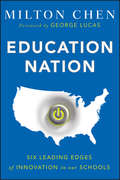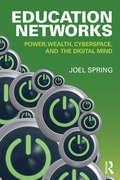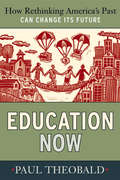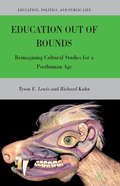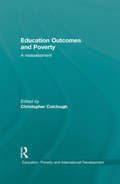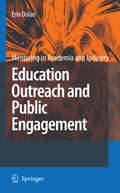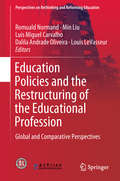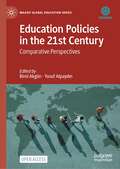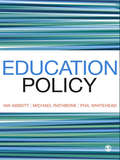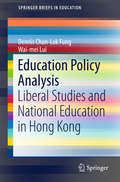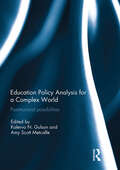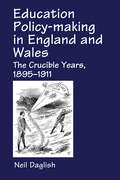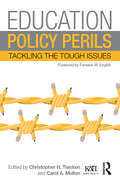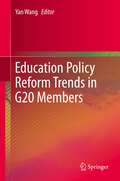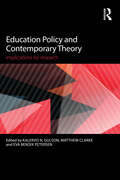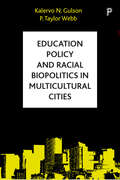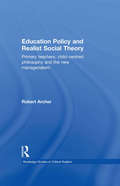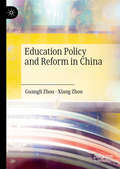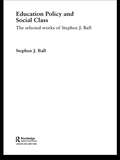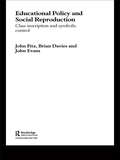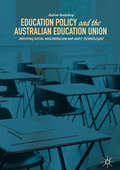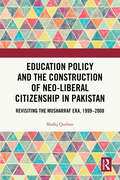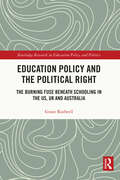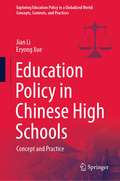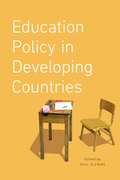- Table View
- List View
Education Nation
by George Lucas Milton ChenAn educational innovator who worked at Sesame Workshop and The George Lucas Educational Foundation offers a new vision for learningAs a result of constant innovation, learning is no longer limited by traditional confines and we're moving beyond students tied to their chairs, desks, and textbooks-and teachers locked away in classrooms. In Education Nation author Milton Chen draws from extensive experience in media-from his work on Sesame Street in its nascent years to his role as executive director of the George Lucas Educational Foundation-to support a vision for a new world of learning.This book, in six chapters, explores the "edges" in education--the places where K-12 learning has already seen revolutionary changes through innovative reform and the use of technology. Examines ways in which learning can be revolutionized through innovative reform and the use of technologyExplores the ever-expanding world of technology for breakthroughs in teaching and learningIncludes many wonderful resources to support innovation in schools across the nation This important book offers a clear vision for tomorrow's classrooms that will enhance learning opportunities for all children.
Education Networks: Power, Wealth, Cyberspace, and the Digital Mind (Sociocultural, Political, and Historical Studies in Education)
by Joel SpringEducation Networks is a critical analysis of the emerging intersection among the global power elite, information and communication technology, and schools. Joel Spring documents and examines the economic and political interests and forces —including elite networks, the for-profit education industry, data managers, and professional educators — that are pushing the use of ICT for online instruction, test preparation and tutoring, data management, instructional software packages, and more , and looks closely at the impact this is having on schools, students, and learning. Making a distinction between "mind" (as socially constructed) and "brain" (as a physiological entity), Spring draws on recent findings from comparative psychology on the possible effects of ICT on the social construction of the minds of students and school managers, and from neuroscience regarding its effect on students’ brains. Throughout, the influence of elite networks and powerful interest groups is linked to what is happening to children in classrooms. In conclusion Spring offers bold suggestions to change the course of the looming technological triumph of ICT in the "brave new world" of schooling.
Education Now: How Rethinking America's Past Can Change Its Future
by Paul TheobaldEducation Now is a clear and persuasive account of the way in which popular seventeenth- and eighteenth-century theories about the human condition formed the basis for America's choices in the realms of politics, economics, and education. Theobald chronicles the fate of alternative, less popular ideas about the human condition-ideas that would have led to vastly different political, economic, and educational landscapes than those we experience today. This book exposes the flaws among prevalent theories and the strength of those alternatives that were dismissed or ignored. In so doing, Theobald points the way toward substantive changes across three dimensions ubiquitous to human life: politics, economics, and education.
Education Out of Bounds
by Tyson E. Lewis Richard KahnThrough a unique combination of critical, posthumanist, and educational theories, the authors engage in a surreal journey into the worlds of feral children, alien reptoids, and faery faiths in order to understand how social movements are renegotiating the boundaries of community.
Education Outcomes and Poverty: A Reassessment (Education, Poverty and International Development)
by Christopher ColcloughWhat do we know about the outcomes of education in developing countries? Where are the gaps in our knowledge, and why are they important to fill? What are the policy challenges that underlie these knowledge gaps, and how can education best contribute to eliminating the problem of widespread poverty in the developing world? This book arises out of a five year, DFID-funded programme of research examining the impact of education on the lives and livelihoods of people in developing countries, particularly those living in poorer areas and from poorer households. Based on highly innovative research that addressed common research questions across four countries in Africa and South Asia, the book presents new theoretical and empirical knowledge that will help to improve education and poverty reduction strategies in developing countries, through an enhanced recognition of education's actual and potential role. In addition to introducing the reader to a wide range of conceptual and policy-related problems concerning the impact of education on individuals and society, the book: provides the field of educational research with a contemporary economic and socio-cultural reassessment of educational outcomes in relation to poverty. discusses the challenges and priorities facing policy makers, practitioners and the international development community in improving the outcomes of education, particularly for the most disadvantaged in Africa, South Asia and other low income countries; identifies the key theoretical and methodological challenges involved in researching the outcomes of education for the poor. This book will appeal to undergraduate and postgraduate students and researchers in the fields of international and comparative education, education policy, development studies, African and Asian studies and related disciplines, and to those working on education policy at national or international levels in governments and international institutions. Education has an extraordinarily important role to play in efforts to eliminate poverty world-wide. This book reveals the nature and complexity of these relationships and provides indispensible pointers to the kinds and extent of policy changes that are required.
Education Outreach and Public Engagement
by Erin DolanThe purpose of this series is to provide resources related to teaching and career development for faculty at all stages of their careers and to scientists considering careers in industry. Young faculty (or graduate students and post docs thinking about going into academia) will find valuable information about how to design a course, how to find the right job, including academia and industry, and how to incorporate undergraduate research into their programs.
Education Policies and the Restructuring of the Educational Profession: Global and Comparative Perspectives (Perspectives on Rethinking and Reforming Education)
by Romuald Normand Min Liu Luís Miguel Carvalho Dalila Andrade Oliveira Louis LeVasseurThe book analyzes worldwide changes in school organization and the teaching profession, and how the profession has been impacted by education policies that promote assessments and accountability. It also identifies some shifts in professional positions, statuses and profiles, and characterizes the impact and contextualization of professional standards that shape teaching practices and the management of schools. Further, the book provides relevant comparative and empirical data on the restructuring of the teaching profession in an era of globalization through a critical perspective on and an overview of the main research and comparative findings across countries. As such, the book is not only directed to educational researchers but will also interest professionals and policymakers, addressing a broader education and policy community concerned by the new aspects shaping the teaching profession in the 21st century.
Education Policies in the 21st Century: Comparative Perspectives (Maarif Global Education Series)
by Yusuf Alpaydın Birol AkgünThis open access book explores the agenda of education policies in the 21st century. In the first part of the book, education is handled from a historical and political framework, and the effects of the change of states and policies on education are examined. In the second part, the effects of changes in the economy on education policies and economies’ demands from educational institutions are examined. In the last section, current policies in the international education sector, which is growing day by day as a result of increasing globalization and internationalization, are examined and future trends are tried to be revealed. In articles written by academics from different universities all over the world, the topics are presented in a comparative perspective.
Education Policy
by Mr Ian Abbott Phillip Whitehead Michael Rathbone'A splendid read. Via interviews with several Secretaries of State for Education and a supporting analytical commentary, Education Policy provides a fascinating insight and historical appraisal of English policy rationale'-Dr David Kitchener, Reader in Education, University of Bolton 'This book should be compulsory reading, not only for people interested in the history of education policy but also for policy makers, to remind them of what has gone before'-Dr Andrew Townsend, University of Nottingham From Butler to Balls and beyond, this essential book illuminates educational issues in England and Wales since WWII, drawing on extensive documentary evidence. Inside you will find in-depth interviews with former Secretaries of State for Education and other key decision-makers, including: - Ed Balls - David Blunkett - Michael Gove - Alan Johnson - Ruth Kelly The interviews cover the historical context of their period of office and the lasting legacy of their policies. This is a must-read for Masters-level students on Education courses and PGCE programmes, and will be valuable to undergraduates studying modern history and social policy. Ian Abbott is Director of the Warwick Institute of Education. Mike Rathbone was previously Director of Continuing Professional Development in the Institute of Education. Phil Whitehead is the course leader for the secondary PGCE (Teach First). All are at the University of Warwick.
Education Policy Analysis
by Dennis Chun-Lok Fung Wai-Mei LuiThis book reports on a five-year longitudinal study of the policy relating to the introduction of Liberal Studies, which was developed as an interdisciplinary curriculum in the New Senior Secondary (NSS) academic structure in post-colonial Hong Kong. It also examines the implementation of Moral and National Education, which has become one of the most recent controversial issues in Hong Kong's education policy. Adopting a cross-subject perspective, it concludes by illustrating the roles of Liberal Studies and Moral and National Education in strengthening multi-disciplinary learning and citizenship education in the NSS academic structure.
Education Policy Analysis for a Complex World: Poststructural possibilities
by Kalervo N. Gulson Amy Scott MetcalfeIn the past decade, post-structural policy analysis in education has evolved, primarily focusing on disrupting dominant narratives about education policy research, development and implementation, and the aims and outcomes of the policy-research nexus. This book originates from an ‘Education Policy Analysis for a Complex World’ workshop held in conjunction with the University of British Columbia and sponsored by a Canadian Social Sciences and Humanities Research Council Connection Grant. The workshop focused on one over-arching question: To what extent can post-structural theories offer innovative policy analyses, and contribute to new forms of policy development and implementation? The chapters in this collection provide responses from the participants of the workshop, and serve as illustrations of the broad range of scholarship that may be identified as post-structural policy analysis. This book was originally published as a special issue of Critical Studies in Education.
Education Policy Making in England and Wales: The Crucible Years, 1895-1911
by Neil DaglishThe lack of educational provision for the majority towards the and of the 19th century attracted the attention of education policy-makers who wished to remedy the situation. This overview draws on unpublished sources to describe and analyse the crucible years for 20th-century English education.
Education Policy Perils: Tackling Tough Issues (Kappa Delta Pi Co-Publications)
by Carol A. Mullen Christopher H. TienkenEducation Policy Perils provides educators and those interested in the future of public education with research-based and practical analyses of some of the foremost issues facing public schools today. The collection, written by experienced scholar-practitioners, offers insights that include nuanced descriptions of various challenges facing educators and recommendations for overcoming them with an eye toward more successful policy and better implementation. The authors apply their expertise to a range of issues from international testing to policy challenges related to curriculum on the state and national levels. This volume positions ongoing debates within the wider context of an education landscape struggling to displace junk-science ideology with empirical research. The scope and sequence combined with the expertise of the contributors make this volume a vital resource for educators at all levels during a pivotal time of major changes in education policy.
Education Policy Reform Trends in G20 Members
by Yan WangG20 members bring together the world's major advanced and emerging economies, as well as the European Union. Together they represent some 90% of global GDP, 80% of global trade and two-thirds of the world's population. In recognition of educational development as a key driver of economic development, the G20 members have put education reform high on their policy agenda in order to meet the challenges and embrace the opportunities ahead. Their experiences and lessons in education reform will not only showcase the global trend of education development, but also will provide valuable reference and inspiration for undertaking education reform to advance national development in China as well as other countries. This book documents recent policy reform in G20 members' systems, showcases the global trends in education policy, serves as a valuable reference tool and also provide inspiration for undertaking education reform to advance development in related countries.
Education Policy and Contemporary Theory: Implications for research
by Matthew Clarke Eva Bendix Petersen Kalervo N. GulsonThis book aims to posit theory as a central component to the study of education and education policy. Providing clear, introductory entries into contemporary critical theories and their take up in education policy studies, the book offers a generative invitation to further reading, thought and exploration. Instead of prescribing how theory should be used, the contributors elaborate on a set of possibilities for researching and critiquing education policy. Education Policy and Contemporary Theory explores examples of how theoretical approaches generate a variety of questions for policy analysis, demonstrating the importance of theory as a necessary and inevitable resource for exploring and contesting various policy realms and dominant discourses. Each chapter provides a short overview of key aspects of a particular theory or perspective, followed by suggestions of methodological implications and recommended readings to extend the outlined ideas. Organized around two parts, the first section focuses on theorists while the second section looks at specific theories and concepts, with the intention that each part makes explicit the connection between theory and methodology in relation to education policy research. Each contribution is carefully written by established and emerging scholars in the field to introduce new scholars to theoretical concepts and policy questions, and to inspire, extend or challenge established policy researchers who may be considering working in new areas.
Education Policy and Racial Biopolitics
by Kalervo N. Gulson P. Taylor WebbThe empirical focus of this book is on the twenty year struggle by parents and members of the Black community in Toronto to introduce an Africentric Alternative School (AAS) with Black-focused curricula. It brings together a seemingly disparate series of events that emerged from equity and multicultural narratives about the establishment of the school – violence, anti-racism and race-based statistics, policy entrepreneurs, and the re-birth of alternative schools in Toronto - to illustrate how these events ostensibly functioned through neoliberal choice mechanisms and practices. Gulson and Webb show how school choice can represent and manifest the hopes and fears, contestations and settlements of contemporary racial biopolitics of education in multicultural cities.
Education Policy and Realist Social Theory: Primary Teachers, Child-Centred Philosophy and the New Managerialism (Routledge Studies in Critical Realism #No.3)
by Robert ArcherIn Europe welfare state provision has been subjected to 'market forces'. Over the last two decades, the framework of economic competitiveness has become the defining aim of education, to be achieved by new managerialist techniques and mechanisms. This book thoughtfully and persuasively argues against this new vision of education, and offers a different, more useful potential approach.This in-depth major study will be of great interest to researchers in the sociology of education, education policy, social theory, organization and management studies, and also to professionals concerned about the deleterious impact of current education policy on children's learning and welfare.
Education Policy and Reform in China
by Xiang Zhou Guangli ZhouThis book examines educational development and reform in contemporary China and focuses on some of the major issues facing education in both rural and urban areas, across the spectrum of primary, secondary, higher, adult and vocational educational pathways. The book reflects on Chinese educational strategies at a time of rapid development of the market economy and the need to promote the modernization of education. It also considers how social reform and educational changes go hand in hand and discusses the right to education irrespective of gender, nationality, particularly examining the case of children from migrant families. From the rapid development of preschool and compulsory education to the modernization of the university system, this book highlights China’s ambition to create a top tier education system, fostering talent to match its requirements in a fast moving employment market and knowledge economy.
Education Policy and Social Class: The Selected Works of Stephen J. Ball
by Stephen J. BallBringing together twenty years of research and writing, this book provides an overview of Stephen Ball’s career and shows not only the development of his most important ideas but also the long-lasting contributions he has made to the field of educational policy analysis. This volume contains sixteen key essays divided into three sections: perspectives on policy research policy technologies and policy analysis social class and education policy. Each chapter presents innovative ways of thinking about public policy, asking probing questions about what policy is, how policy is influenced and what effects intentional and unintentional policies have. As a body of work, this collection raises issues of ethics and social justice which are often neglected in the mass of policies that now affect every aspect of our education systems.
Education Policy and Social Reproduction: Class Inscription & Symbolic Control
by Brian Davies John Fitz John EvansThis book takes a theoretically informed look at British education policy over the last sixty years when secondary schooling for all children became an established fact for the first time. Comprehensive schools largely replaced a system based on academic selection. Now, under choice and competition policies, all schools are subject to the rigours of local education markets. What impact did each of these successive policy frameworks have on structures of opportunities for families and their children? How and to what extent was the experience of secondary school students shaped and what influenced the qualifications they obtained and their life chances after schooling? The authors locate their work within two broad strands in the sociology of education. Basil Bernstein’s work on the realisation of power and control in and through pedagogic discourse and social reproduction provides a theoretical framework for exploring the character of and continuities and change in education and training policies. The book is an important contribution to debates about the extent to which education is a force for change in class divided societies. The authors also set out to re-establish social class at the centre of educational analysis at a time when emphasis has been on identity and identity formation, arguing for their interdependence. This book will be an important resource for students, policy analysts and policymakers wishing to think through and understand the longer term impact of programmes that have shaped secondary schooling in Britain and elsewhere.
Education Policy and the Australian Education Union: Resisting Social Neoliberalism And Auditing Technologies
by Andrew VandenbergThis book focuses on the politics of teacher resistance to the formation and implementation of neoliberal education policies in Australia. It argues that policies such as publishing examination test results online amounts to auditing teachers’ work, and assumes incompetence from teachers, which ultimately results in diverting teachers from their true professional responsibilities. The book outlines the rise of transnational networks that promote market-oriented methods of achieving social objectives, such as good education for all students, and considers a range of explanations for why this education policy was strengthened in Australia in 2010. It also reviews a range of arguments about professional unionism, and reflects on the history of the Australian Education Union and its capacity to resist social neoliberalism. The book concludes by reporting on a case-study in which principals, teachers and parents at two ordinary schools in Australia have managed to keep market forces at bay. It will appeal to students and researchers in the fields of education and sociology, particularly those interested in education policy, political ideology, unionism, and schools.
Education Policy and the Construction of Neo-Liberal Citizenship in Pakistan: Revisiting the Musharraf Era, 1999-2008
by Shafiq QurbanThis book looks at Musharraf’s Education Reforms in Pakistan and analyses the relationship between education policy, curriculum, Pakistani identity and citizenship. It explores changes in the curriculum and how a reformed curriculum has shaped Pakistani identity according to the exigencies of time. The book underscores the significant role that Musharraf’s reforms to revamp the curricula at formal educational institutions, from primary to higher education levels, as well as in the Madrassas, to make the curricula compatible with global education trends. The government aimed to replace all outdated content that promoted hatred, extremism and the status quo, with new themes informed by tolerance, interfaith harmony, human rights, environmental preservation, loyalty, the moderate vision of Islam, and skills orientation. The purpose of these themes in the curricula was to make education market-oriented and to construct a Pakistani identity in the context of Neo-Liberal Citizenship. The book provides an in-depth look into the transformation of education curriculum in Pakistan focusing on the exploration of the intersections between education, politics, and citizenship in Pakistani society.This book is an essential read for anyone interested in understanding the impact of education policies on citizenship and political processes in Pakistan. Its insightful analysis and thorough research make it an excellent resource for students, scholars, and teachers working in the fields of anthropology, citizenship studies, education, Islamic studies, gender studies, Pakistan studies, political science, political sociology, public policy and South Asian studies."
Education Policy and the Political Right: The Burning Fuse beneath Schooling in the US, UK and Australia (Routledge Research in Education Policy and Politics)
by Grant RodwellThis work attempts a comparative description and analysis, focusing on the US, the UK, and Australia on the topic of the Right, educational policy, and schooling. It adopts as its underlying theme the burning fuse in tracing the topic back to Joseph de Maistre a Rightist who fled revolutionary France to seek safety in the company of Tsar Alexander I’s Russian Empire. Here, he had much to say about school education, not for all, but rather the “deserving” social elite. During the past three or four decades in the US, the UK, and Australia, the Right has been remarkably successful in amassing political power. And in doing so, the right of politics in these countries has reshaped school educational policy and practice, a necessary step in securing the future of the Right as a political force. Moreover, even during the years the Right has been on the opposition benches in these countries, such has been the strength of their political force that governments of the Left have acquiesced to much of their school educational policy. A pioneering effort, this book asserts that to understand school educational policy in the third decade of the 21st century, we need to comprehend the politics of the Right. This book will be of interest to researchers and postgraduate students interested in Education Studies, Theory and Policy, and International and Comparative Education.
Education Policy in Chinese High Schools: Concept and Practice (Exploring Education Policy in a Globalized World: Concepts, Contexts, and Practices)
by Jian Li Eryong XueThis book investigates the education policy in Chinese high schools from both concept and practice perspectives. It offers a specific lens to explore Chinese high school education since the reform and opening up, the teacher policy in Chinese high schools, the curriculum and textbook policy in Chinese high school, the school layout policy of Chinese high school education, the enrollment policy of college entrance examination, and the diversified development of high school education in China. All those dimensions related to exploring the education policy in Chinese high schools offer an understanding of the modernization of high school education in contemporary China since 1949. This book provides multiple perspective to investigate the systematic landscape of high school education, contextually.
Education Policy in Developing Countries
by Paul GlewweAlmost any economist will agree that education plays a key role in determining a country s economic growth and standard of living, but what we know about education policy in developing countries is remarkably incomplete and scattered over decades and across publications. "Education Policy in Developing Countries"rights this wrong, taking stock of twenty years of research to assess what we actually know and what we still need to learn about effective education policy in the places that need it the most. Surveying many aspects of education from administrative structures to the availability of health care to parent and student incentives the contributors synthesize an impressive diversity of data, paying special attention to the gross imbalances in educational achievement that still exist between developed and developing countries. They draw out clear implications for governmental policy at a variety of levels, conscious of economic realities such as budget constraints, and point to crucial areas where future research is needed. Offering a wealth of insights into one of the best investments a nation can make, "Education Policy in Developing Countries"is an essential contribution to this most urgent field. "
